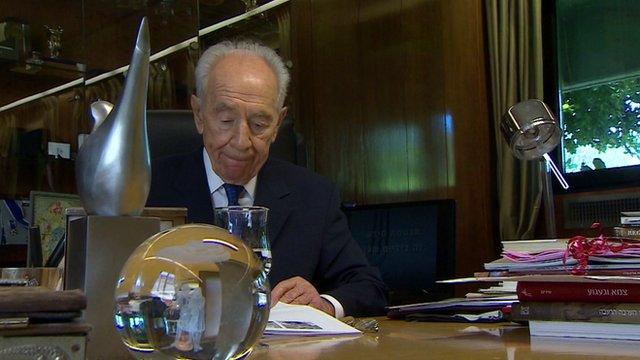World leaders to attend funeral for Israel's Shimon Peres
- Published
Lyse Doucet spoke to Israel's President Shimon Peres in the run-up to his 90th birthday
A long list of world leaders will attend the funeral of former Israeli Prime Minister and President Shimon Peres, who died on Wednesday at 93.
Some of the world's most powerful figures will be at the service in Jerusalem on Friday, including US President Barack Obama.
Mr Peres's condition had deteriorated after suffering a stroke two weeks ago.
He was one of the last of a generation of Israeli politicians present at the nation's birth in 1948.
Mr Peres won the Nobel Peace Prize in 1994 for his role negotiating the Oslo peace accords with the Palestinians a year earlier, a prize he shared with Prime Minister Yitzhak Rabin, and Palestinian leader Yasser Arafat.
The agreement was witnessed by former US President Bill Clinton and signed at the White House. On Wednesday Mr Clinton said on Twitter: "I will miss Shimon Peres, my brilliant and eloquent friend. His life was a blessing to all who strive for peace..."
Ehud Barak: Peres 'never gave up' on pursuit of peace
Other world leaders set to attend the funeral on Friday include UN Secretary General Ban Ki-moon, German Chancellor Angela Merkel, French President Francois Hollande, former French President Nicolas Sarkozy, Canadian Prime Minister Justin Trudeau, Australian Prime Minister Malcolm Turnbull and Mexican President Enrique Pena Nieto.
Mr Peres will receive a state burial at a ceremony on Friday at Mount Herzel Cemetery in Jerusalem.
Palestinian Authority President Mahmoud Abbas sent a letter of condolence to Mr Peres' family "expressing his sorrow and sadness".
"Peres was a partner in creating the peace of the brave with the late President Yasser Arafat and Prime Minister Rabin, and has made intensive efforts to reach a long-lasting peace since the Oslo agreement and until the last breath," he said in a statement.
It is not clear if Mr Abbas will attend the funeral.
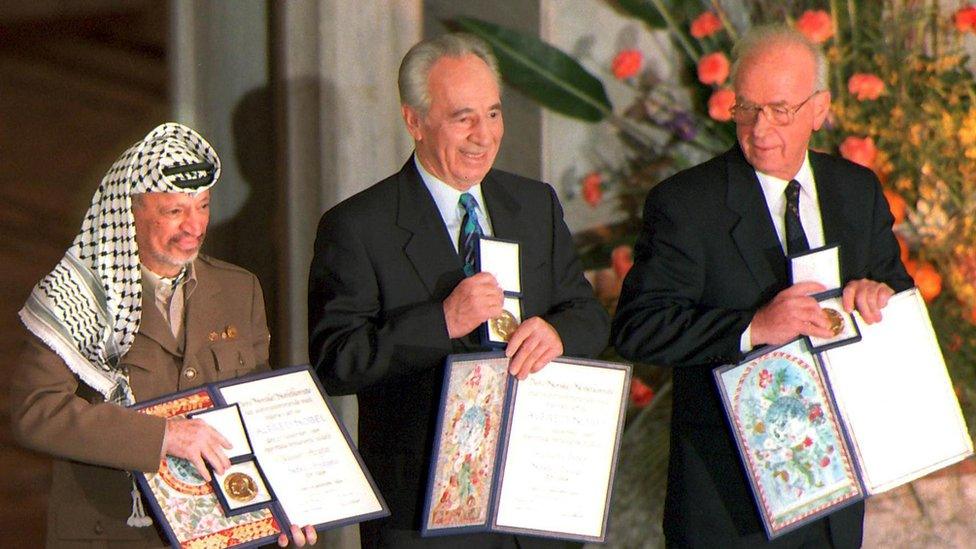
Mr Peres shared the 1994 Nobel Peace Prize for his part in negotiating a peace deal with the Palestinians
However, some Palestinians and others across the Middle East were not mourning his passing. Abdul Rahman Daireyeh, a resident in Ramallah, told the BBC:
"He [Peres] is a war criminal who has killed hundreds of Palestinians. He was never a man of peace. Towards the end of his life, he appeared as a man of peace but he was never that person, as he killed hundreds."
The militant Palestinian Islamist movement Hamas, said that Mr Peres's death was the "end of the history of occupation".
Mr Peres once said the Palestinians were Israel's "closest neighbours" and might become its "closest friends".
His son, Chemi, said of his father: "He served our people before we even had a country of our own. He worked tirelessly for Israel from the very first day of the state to the last day of his life."
Chemi Peres said his father "worked tirelessly for Israel - from the first day of the state to the last day of his life"
Israel's Prime Minister Benjamin Netanyahu expressed his "deep sorrow" over Mr Peres' death in a video statement.
"As a man of peace, he worked until his final days toward reconciling with our neighbours for a better future for our children.''
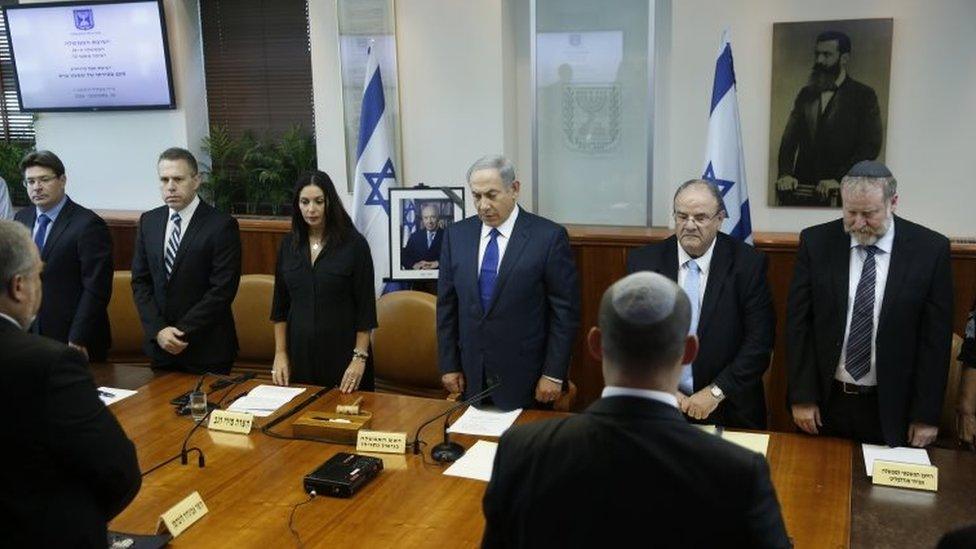
A special cabinet meeting was called to mourn Mr Peres' death
Once an advocate of Jewish settlements in the occupied West Bank, Mr Peres later became a leading political dove. He often spoke of the need for compromise over territorial demands in Palestinian areas.

Who was Shimon Peres?
Born in 1923 in Wisniew, Poland, now Vishnyeva, Belarus
First elected to the Knesset (Israeli parliament) in 1959
Served in 12 governments, including once as president and twice as prime minister
Seen as a hawk in his early years, when he negotiated arms deals for the fledgling nation
In 1996 he ordered the so-called Operation Grapes of Wrath on Beirut in retaliation for Lebanese Hezbollah's escalated rocket-fire on northern Israel. The bombing campaign killed and injured hundreds of civilians
A member of the government that approved the building of Jewish settlements on occupied Palestinian territory, though he came to see them as an obstacle to peace
But played a key part in reaching the Oslo peace accords, external, the first deal between Israel and the Palestinians, which said they would "strive to live in peaceful coexistence"

Israeli President Shimon Peres: "One state for the two nations means to internalise the conflict between us"
- Published28 September 2016
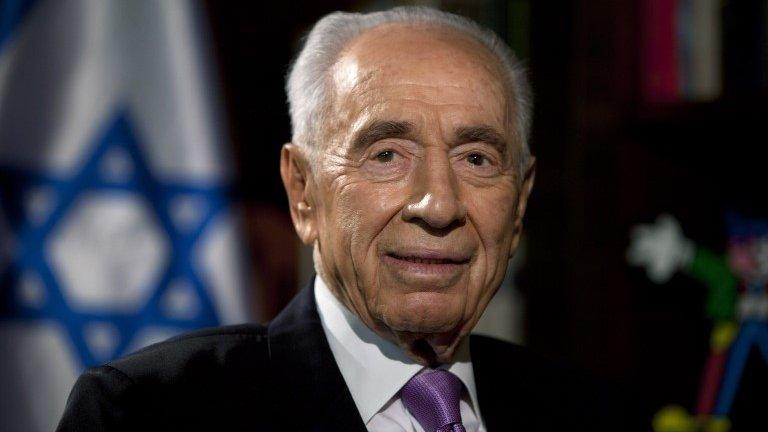
- Published28 September 2016
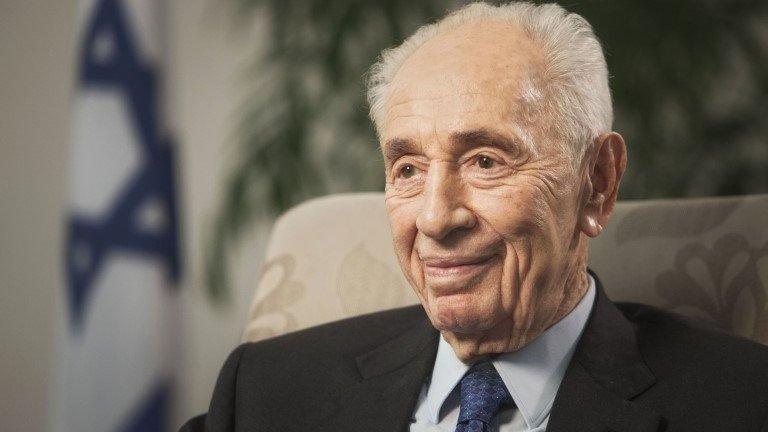
- Published3 August 2013
